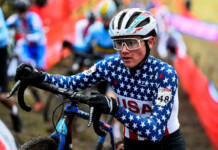By Joshua Poppel – Village Bicycle Project (VBP) is a non-profit that operates in Ghana and Sierra Leone, whose mission is to utilize bicycles to promote rural development by providing access to education, health care and sustainable transportation. The organization was founded in Ghana in 1999 and has since expanded to include Sierra Leone and employ a team of 12 local employees across the two countries. When VBP began working in Sierra Leone in 2009, the country was recovering from a decade-long civil war that had decimated the human, physical, and economic infrastructure. The citizens of Sierra Leone also endured a horrific outbreak of Ebola a few years later which further undermined the stability of the population. The introduction of bicycles and related training was particularly timely and appropriate in bringing Africa’s rural poor into the recovery process, strengthening access to work and education.
Bicycles offer positive change and development to villagers who use them for health, wealth, and education. Bicycles improve access to farms, markets, jobs, schools, and healthcare in developing nations. Many rural children in Africa walk miles each day to get to school. Bicycles enable children in remote villages to get to school more quickly–a quarter of the time spent walking — and helps support retention in school when they would otherwise drop out.
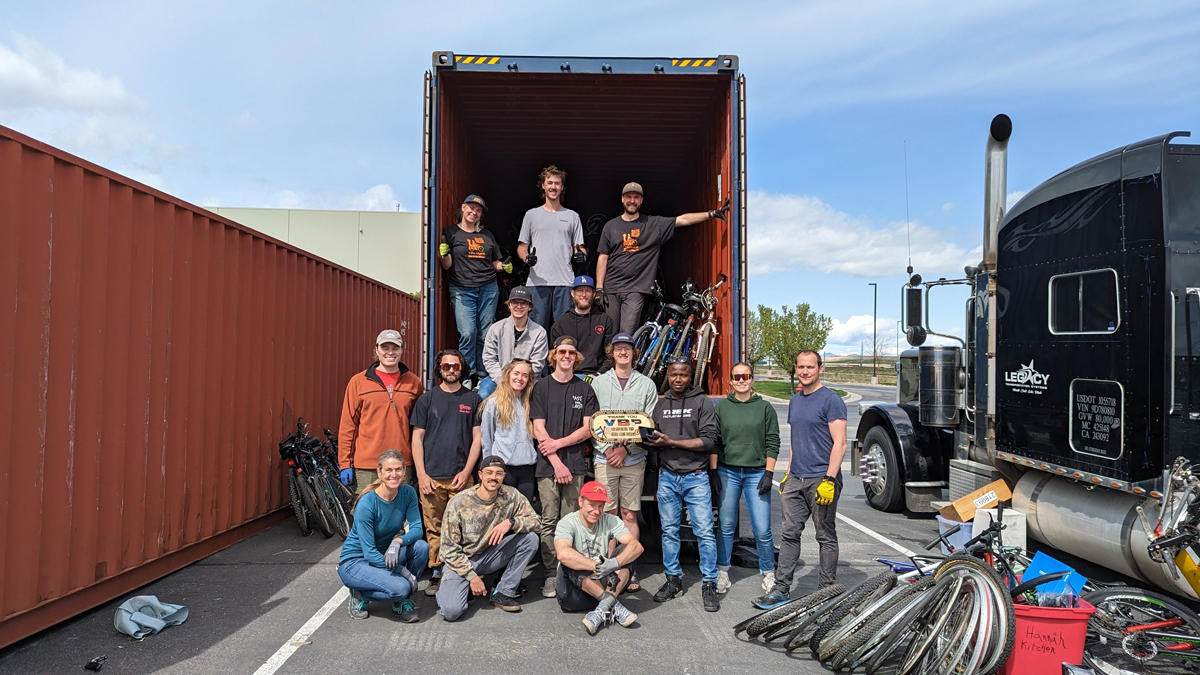
Working in partnership with Peace Corps volunteers and other rural change agents, VBP trainers and bike mechanics provide intensive maintenance instruction to teachers, health workers, agricultural extension workers and students. Individuals who complete the course gain access to a reconditioned bicycle at a discounted price. Training is coordinated with local bike mechanics to distribute tools and strengthen the development of the local bike industry.
As of August 2023, VBP had distributed over 134,000 bikes across West Africa; trained over 22,000 people in basic maintenance and repair skills; provided Learn to Ride Training to over 4,000 women and girls and distributed over 60,000 bicycle-specific tools to mechanics to ensure that different components can be fixed. An evaluation of VBP’s work found that on average each bicycle is used by six people – meaning that its work has so far benefitted over half a million Africans.
To accomplish its goals, Village Bicycle Project has a series of programs, each empowering local citizens with bicycle access or supporting the development of the regional bike industry. The primary focus of VBP’s programming is the One-Day Workshop (ODW) which provides discounted bikes and teaches basic mechanical skills to ensure a well-functioning bike. The experienced instructors engage participants in demonstrations using appropriate tools and spare parts in ensuring participants acquire the skills in maintaining their bikes in the future. VBP is committed to equipping the new bicycle owners with the skills to identify problems early and conduct simple maintenance on their bicycles. They are also taught how to identify larger issues that require bicycle mechanic interventions.
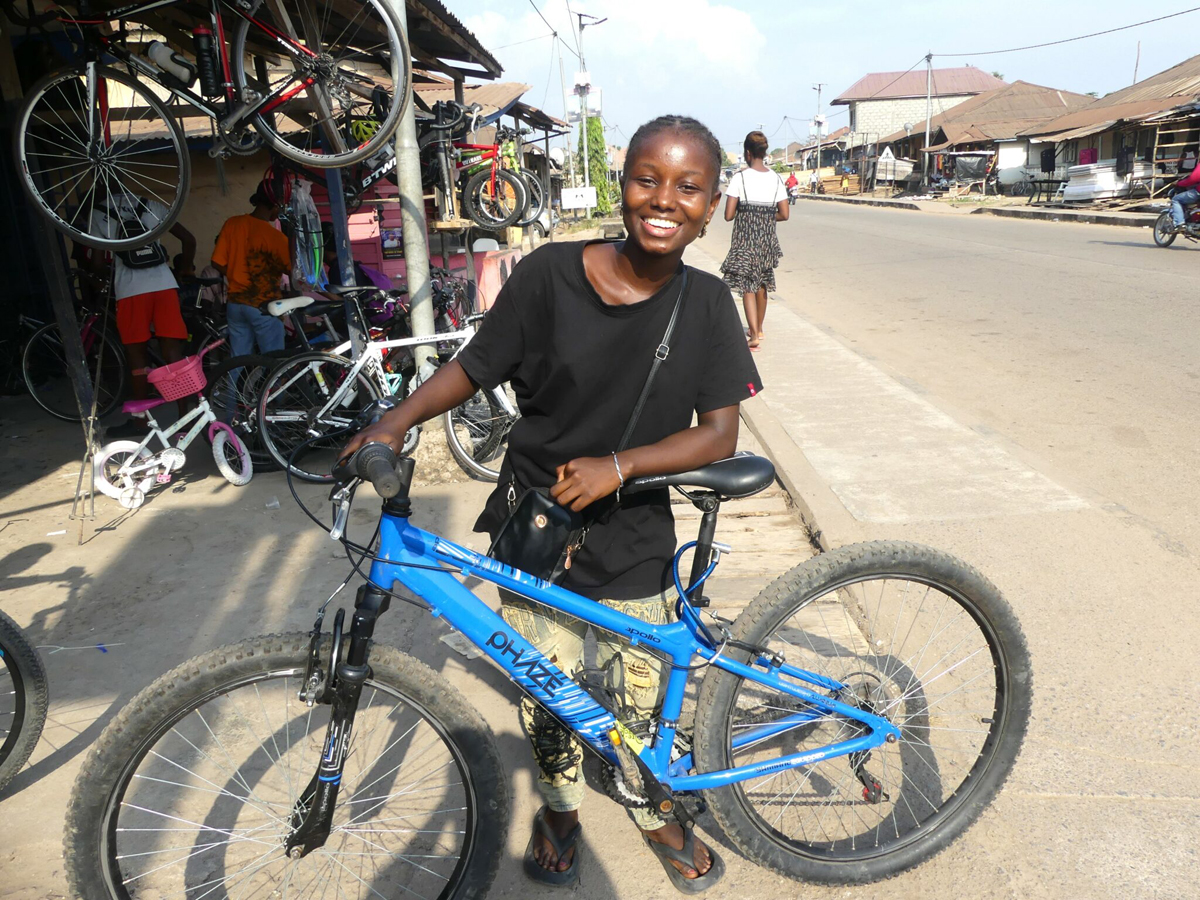
Many of the students that VBP works with in their workshops regularly travel long distances to reach their classrooms. It is not uncommon for students to travel 1 – 2 hours each way, covering a distance up to 8 or 9 miles. Sarah Conteh is one of the older students that VBP has worked with in Sierra Leone. She is an ambitious 18-year-old aspiring lawyer who received a bicycle last year. Prior to receiving her bike, Sarah faced daily challenges commuting to her university in Makeni City, covering a distance of 11 miles round trip. The daily commute not only consumed a significant portion of her funds, but it also took 2.5 hours, presenting a substantial hindrance to her studies and dreams of becoming a lawyer. Now that she has a bike, she has more time and money to pursue her studies.
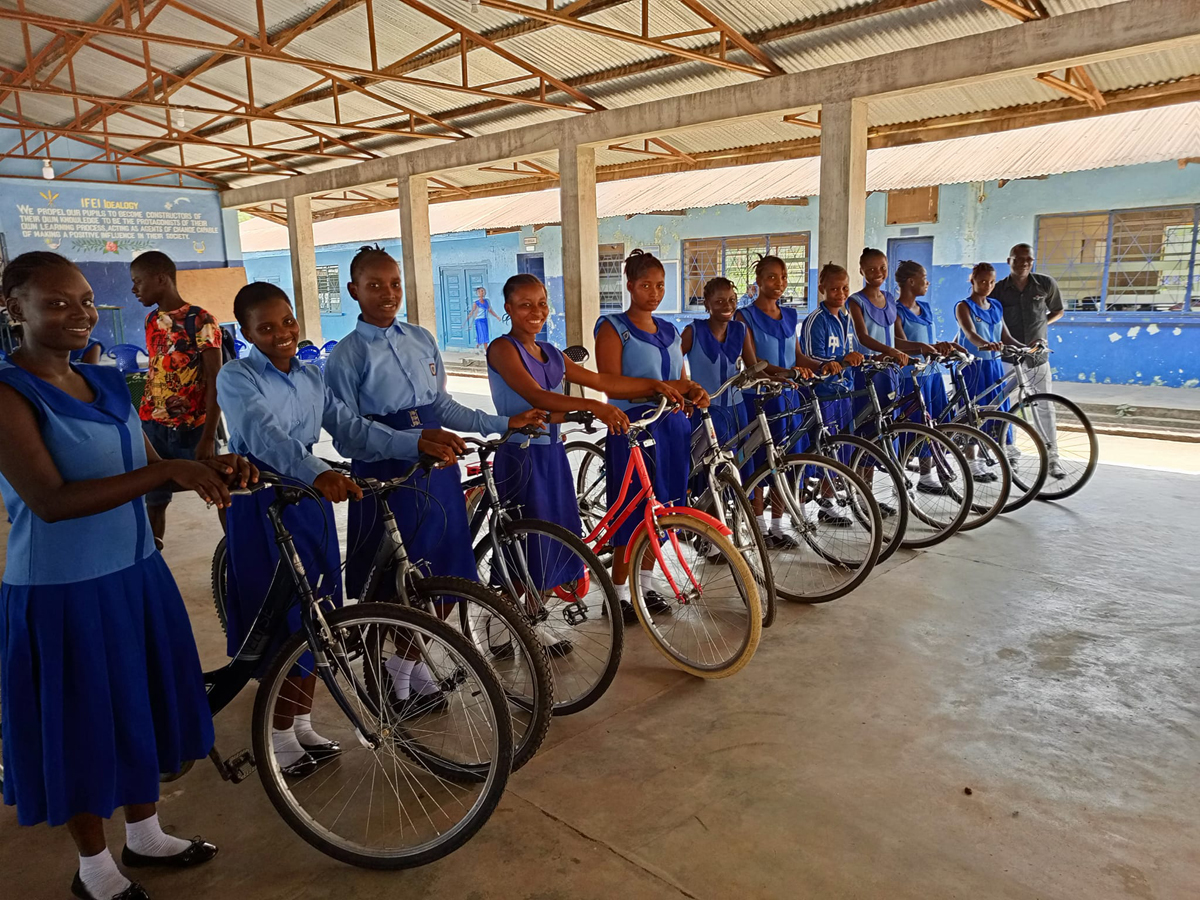
Another focus of VBP’s work is to empower women and girls through Learn to Ride bicycle programs. By prioritizing rural women and girls, VBP can break down the cultural barriers that can prevent women from riding bikes and learning basic bike riding skills. Teaching female community members to ride a bike gives them access to an affordable form of transportation, making it easier for them to get to school, work, farm or wherever they need to go while also addressing gender disparity.
A third element of VBP’s programs is to promote Bicycle Libraries in selected communities and schools. Bicycles are provided with lending guidelines for female community members through associations to create opportunity for women to access bikes. By providing bicycles to community groups, they remain available for use by the women to access markets, schools and health centers. VBP facilitates community sensitization meetings to educate communities on the importance of bicycle access for women and other socio-economic issues.
To support the bikes distributed in rural communities, VBP implements a weeklong intensive Mechanical Training and Advanced Tools Workshop for local field mechanics. To ensure a thriving bicycle culture in Africa, the teams work to equip mechanics with quality tools and expertise to promote confidence and sustainability in this growing transportation realm. These mechanics are also provided a set of specialized bicycle tools after their training. This capacity building of bike mechanics promotes regular bike maintenance culture and provides sustainable work skills.
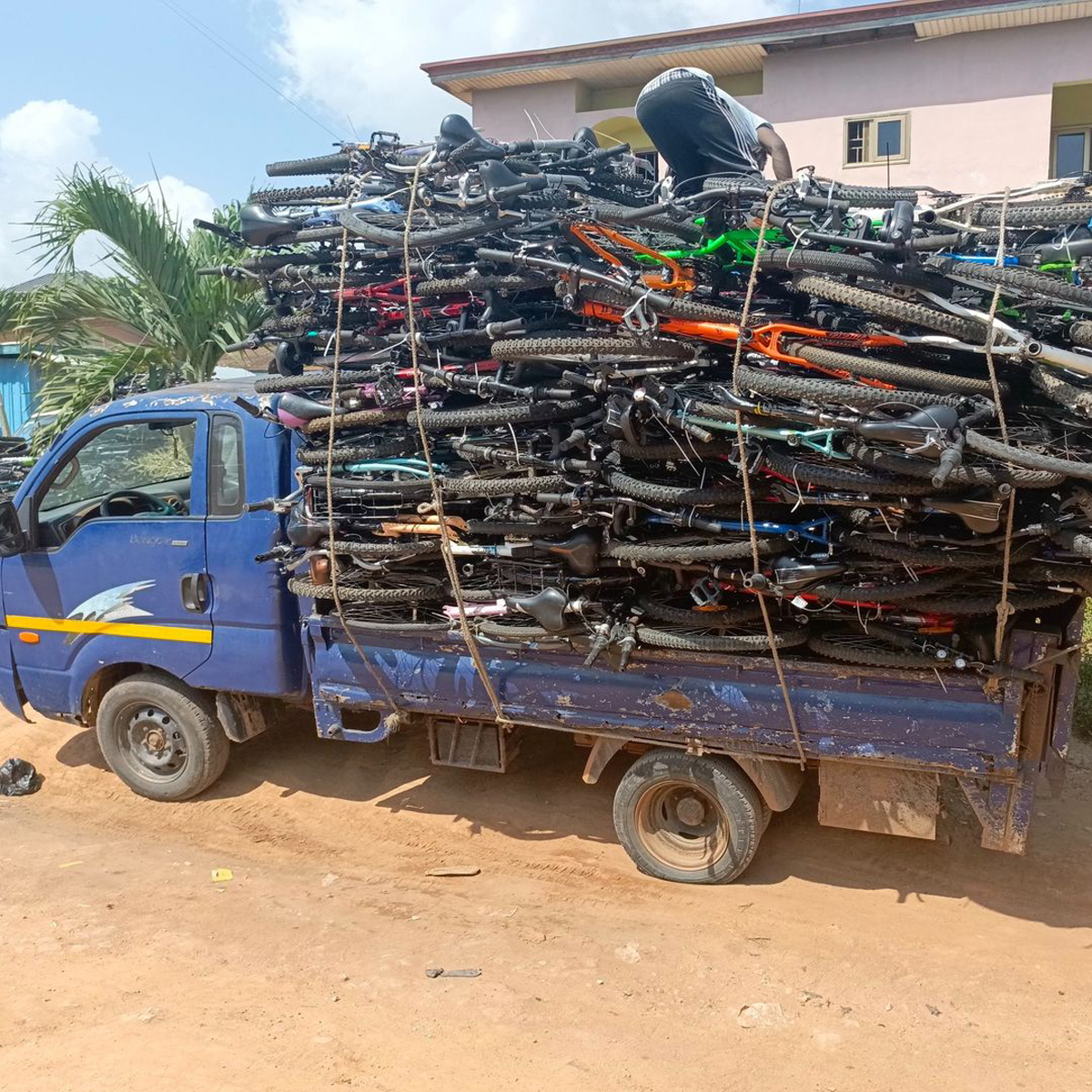
VBP is committed to understanding the impact and effectiveness of its programs and to that end Monitoring and Evaluation are regularly conducted to track the impacts. Metrics such as attendance, retention, grades and household economy and consistently measured and recorded. The committed monitoring and evaluation staff work alongside the trainers to collect pre- and post- data for analysis and for decision making.
In addition to the standard programming of VBP, the organization has also helped to develop local racing teams in Ghana and Sierra Leone. The Lunsar Cycling Team (https://www.lunsarcycling.com/) in Sierra Leone has been particularly successful over the last decade and the team’s founder has created the Tour de Lunsar which attracts riders from all over the world while providing local cyclists a chance to compete on the international level.
Since the cycling team’s inception in 2015, they have gone from strength to strength in racing and community spirit. There are now more than 30 promising young riders on the team, making it the largest club in Sierra Leone. They also have the biggest women’s membership of any club in Sierra Leone and a few of the women have gone on to compete internationally.
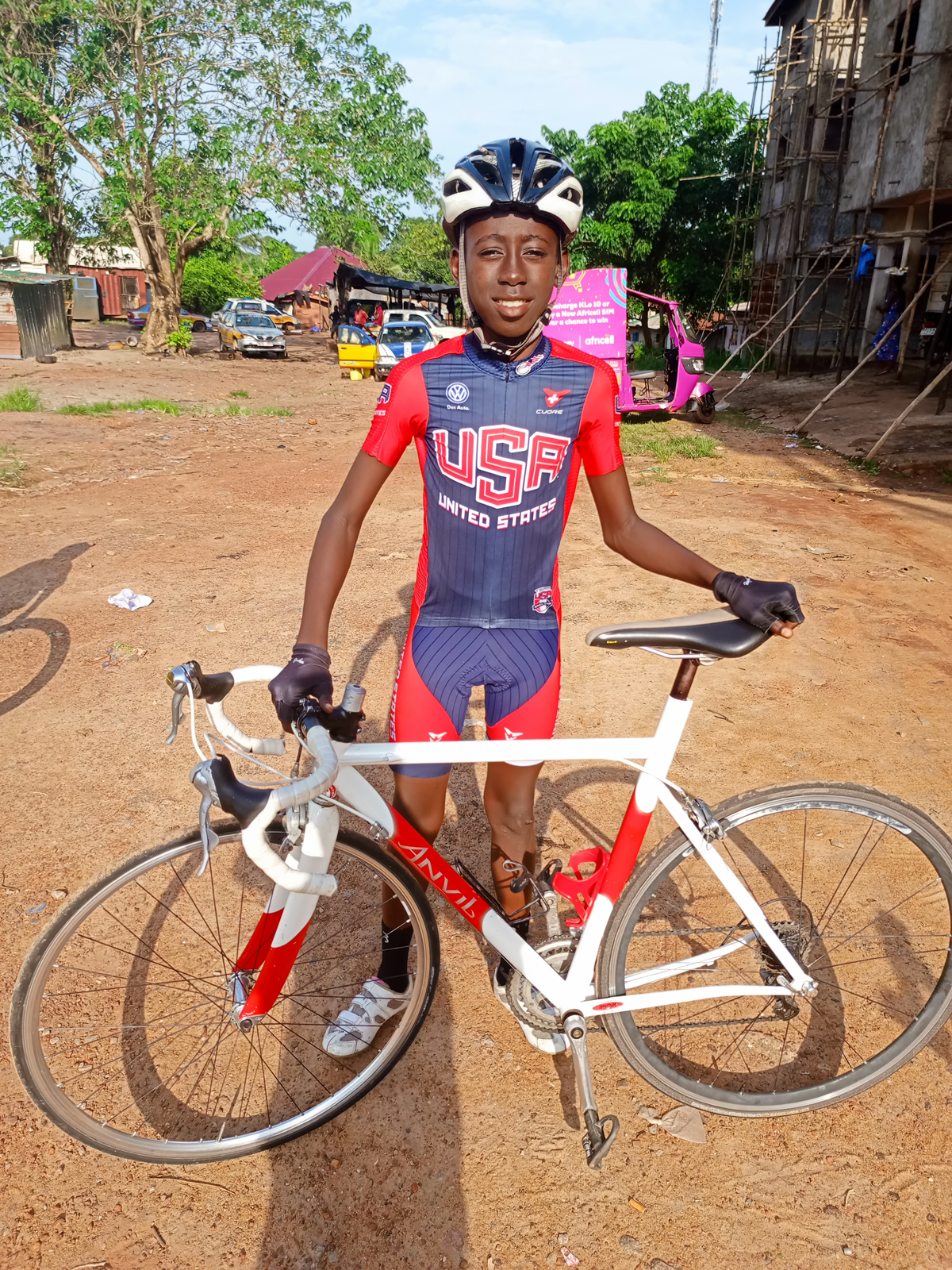
Moudi is a 13-year-old boy who is very enthusiastic about cycling. He received a bike from the last shipment from Salt Lake City and is and excited to race with his new bike. He’s the present champion in the under-13 category in the local races and represents the future of the Lunsar Cycling Team.
Village Bicycle Project is run by a single staff member in the US who is supported by a volunteer Board of Directors. Since 2016, VBP’s Executive Director, Joshua Poppel, has been based in Salt Lake City. During the last seven years, he has established VBP as a local entity accepting donated bikes and used parts, equipment, and clothing. For the past three years, VBP has held a Spring bike drive in Park City and the cumulative bikes donated locally have allowed the organization to ship a container of bikes to Africa each of the last three years. On average, those containers are packed with close to 500 bicycles and much needed spare parts, tools and cycling clothing.
For more information on the Village Bicycle Project, visit: villagebicycleproject.org
Bike Drive:
The 2024 Park City Bike Drive is currently scheduled for Saturday May 18th in the Canyons Village Parking lot from 9-12. Village Bicycle Project accepts donations year-round and can arrange pickups for any bikes, components or gear that is no longer being used. If you have anything you would like to donate or are interested in volunteering with VBP, please contact Joshua at JMPoppel@gmail.com.

